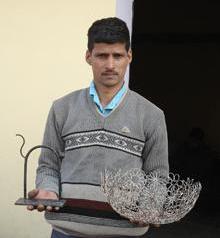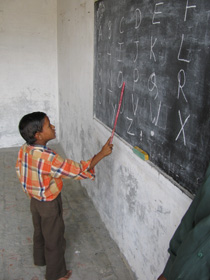
- Low stock - 4 items left
- Inventory on the way
A traditional xylophone, with origins in Africa and Asia, consists of wooden bars of varying lengths with each bar tuned to a specific musical scale. This interesting variation contains bells in various sizes mounted on a wooden board that sets on a flat surface to play. The bells differ in size and scale so each of them will produce a different sound when they are hit with the wooden mallet.
This xylophone, made mostly from recycled scrap metal, is handcrafted by metal artisans at a Noah's Ark workshop in Moradabad, India. Moradabad is one of the largest metal producing cities in India, well known for its high quality metal craftsmanship.
- Measures 6” high x 26-1/2” wide x 7-1/2” deep
- Wooden mallet is 8-3/4” long
Handmade in India and fair trade imported.
Hailing from the Western Indian towns of Kutch and Gujarat, these metal bells were traditionally made for cattle, with different sizes and tones to help herders identify their animals. The artisans, descendants of the Lohar caste which originated in Pakistan, have been making bells for as far back as they can trace their ancestry. These days, bells are made using iron scraps that salvaged from junk yards, then hand-pressed into a variety of shapes and sizes, just as they have been for the past 1,000 years.
After achieving their shape, the bells are covered with powdered copper and mud paste and then baked in a furnace for a rustic finish. The entire process generates a minimal amount of waste, just small traces of metal scrap and burnt mud, and because they’re not welded, a very small amount of energy
 This item was handmade in India in a workshop sponsored by Noah’s Ark, an NGO that offers funding for raw materials, machines and workshop repairs to 100 artisan groups across India. In exchange for assistance, workshops must prove that all employees are paid fair wages for their products and work in safe and clean conditions. Noah's Ark also offers free classes in capacity building to its network of 600 artisans, a rigorous quality control check, and runs education and water sanitation projects to benefit the artisans’ children and the rest of the community. The company has established 20 new workshops in the past 15 years, and all employees are paid 10-15% above the local rate.
This item was handmade in India in a workshop sponsored by Noah’s Ark, an NGO that offers funding for raw materials, machines and workshop repairs to 100 artisan groups across India. In exchange for assistance, workshops must prove that all employees are paid fair wages for their products and work in safe and clean conditions. Noah's Ark also offers free classes in capacity building to its network of 600 artisans, a rigorous quality control check, and runs education and water sanitation projects to benefit the artisans’ children and the rest of the community. The company has established 20 new workshops in the past 15 years, and all employees are paid 10-15% above the local rate.
Noah’s Ark was founded by Mr. Samuel Masih in 1986 back before anyone was familiar with the concept of “Fair Trade.” A businessman from Moradabad, India, Masih observed his other business associates were taking a personal commission from the local metalworking artisans, on top of paying them very low wages for their work. This led to a distrustful and exploitative work environment, and inspired Masih to create a more collaborative environment based on trust and mutual respect.
After two difficult years, Samuel explained his objectives to Mrs. Sullivan of Sullivan Florist in the United  States, who immediately placed an order for US$ 70,000. This led to collaborations with other international companies, including Tear Fund, Artisanat-SEL, Goed Werk, TEAM and Oxfam Australia. Today, the company produces a US $1.5 million in exports and funds Noah's handicrafts and Welfare society, an artisan association created in 2000 to promote artisan welfare, capacity building, childhood education and social work.
States, who immediately placed an order for US$ 70,000. This led to collaborations with other international companies, including Tear Fund, Artisanat-SEL, Goed Werk, TEAM and Oxfam Australia. Today, the company produces a US $1.5 million in exports and funds Noah's handicrafts and Welfare society, an artisan association created in 2000 to promote artisan welfare, capacity building, childhood education and social work.


